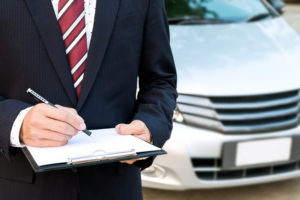Let’s face it, if you’ve been in an accident, then the value of your vehicle is going to take a hit (no pun intended.) While it’s true that your vehicle loses value the minute you drive it off the lot, it does so doubly if it’s been in an accident.
You might be wondering what “diminished value” is in the first place. To put it simply, diminished value is the tangible loss of a vehicle’s market value due to an accident. Insurance-related diminished value is the loss of value due to the aftereffects of the accident and the repair process.
Understand your car’s worth
As the owner of your vehicle, it’s up to you to be an advocate for your car after it’s been in an accident. That means knowing what it’s worth pre-accident and fighting tooth and nail to get it back to that state through your insurance company and the autobody shop.
By law, it’s up to your insurance company to get your vehicle back to its pre-accident state. Yet, if you weren’t all that sure what state it was in, to begin with, then you might fall short of that goal. An insurance adjuster is all so happy to hear you say “good enough” to their repair estimate and appraisal.

Hire an independent appraiser
During the shock of an accident, you might feel a tremendous urge to simply get these moving so you can get back to normal. Insurance companies like having that edge, and they’ll try to streamline the process for you as much as possible at your expense.
While it might seem easy to have an appraiser come out to assess the damage to your vehicle, it’s important to understand that that person is on the payroll of the insurance company. No matter what they say, they will always have the company’s best interests in mind. Believe it or not, you can hire an independent appraiser to look at your vehicle. They’ll be a neutral party and they’ll ensure you get your money’s worth from an insurance claim. These people are called “public adjusters.”
Demand Original Equipment Manufacturer (OEM) parts
Once a check has been cut for your repair and your vehicle is finally at the autobody shop, it’s important to keep up with the process. Importantly, you should ask your mechanic if they use OEM parts. After all, there’s no reason to cut corners when your insurance is paying for the repair.
OEM parts are manufactured exactly like the original parts they are replacing. The alternative to OEM is known as “aftermarket,” and these parts can vary wildly in quality. Insist on OEM parts to get your vehicle back to its original condition.
Don’t always go with the repair shop your insurance suggests
Just like how you asked for an independent appraisal of your vehicle through a public adjuster, you can also take your insurance’s mechanic suggestions with a grain of salt. It’s hard to know why an insurance agency is suggesting a particular mechanic, especially if you’re with a national agency that has no idea who that mechanic is or what their reputation is.
We’d suggest you go with an autobody mechanic that has a stellar reputation, both in the quality of its repairs and its customer service. Most importantly, choose one that understands how to get a car back to its “like new” state, so you can put that accident behind you once and for all.
Are you in need of an autobody mechanic? We’re a collision service in Western Massachusetts that fits the bill. Reach out to us today.


Recent Comments